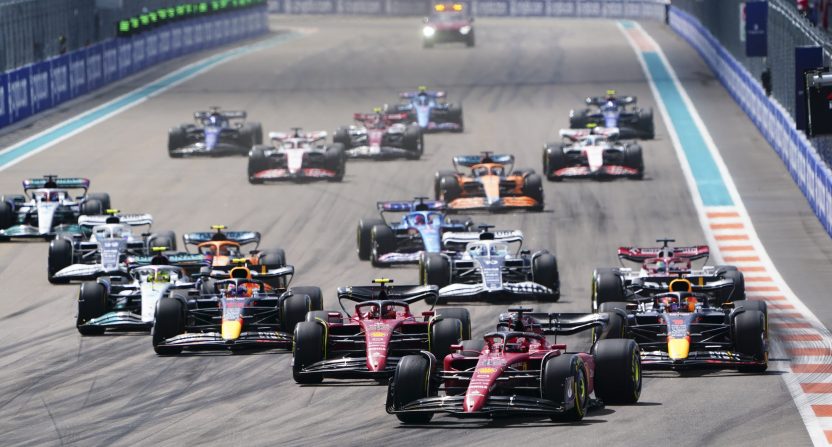ESPN will be retaining the American broadcast rights to Formula 1 after all.
That news comes despite competition from Comcast and Amazon, which clearly saw the value in the growing racing circuit as well. John Ourand and Adam Stern broke the renewal news at Sports Business Journal:
F1 has agreed to renew its rights deal with ESPN through 2025, sources told SBJ’s John Ourand and Adam Stern. The three-year deal still doesn’t have a signed contract, but the racing series told Amazon and Comcast executives on Friday that neither company’s bid was going to be accepted.
Sources say that ESPN has agreed to pay around $75-90M per year for the rights. Currently, ESPN pays in the neighborhood of $5M per year for the rights, having signed a 3-year/$15M deal in 2019.
According to Ourand and Stern, the deal includes provisions that could see a small number of races exclusively on ESPN+, although that feels more like future-proofing the deal or maybe setting up a one-time effort to boost subscriptions than anything else at this point. It’s hard to imagine ESPN and Disney paying that much money (and it is a massive increase) to not put the product in front of as many people as possible as often as possible.
The big question: how will this affect presentation? To this point, ESPN has aired F1 without commercials via the Sky Sports feed. Could this huge bump in what they’re paying lead them to reconsider that?
We wrote about that possibility in May:
Formula 1, of course, has no scheduled stoppages, meaning if rights fees climb high enough networks wanted to run commercials, they’d have to cut away from race action. ESPN tried that for their inaugural race, and the outcry was such that they completely backpedaled on the plan, which has paid dividends. But if ESPN, or another outlet that came in with a strong enough offer to convince Liberty Media to leave the platform and brand of ESPN, felt the need to run ads due to a massive rights number, that would be a huge loss.
Everything reported so far has indicated ESPN was not planning on inserting ads, which makes sense. There’s a strong case to be made that one of the big non-Netflix reasons for the growth of the sport in terms of viewership is the strength of the presentation, including the lack of commercial interruption on race day. Let’s hope that’s the case going forward.
Interestingly, Ourand noted that Netflix did indeed bid, as had been speculated, which could signal future interest in live sports.
Of course, the fact Netflix came in that low could just as easily be a sign they’re not really that serious about it.
ESPN has played just about everything right with F1 so far, and it’s encouraging that they managed to maintain the rights. Formula 1 fans in the United States are likely hoping all the positive trends continue.
[SBJ]
